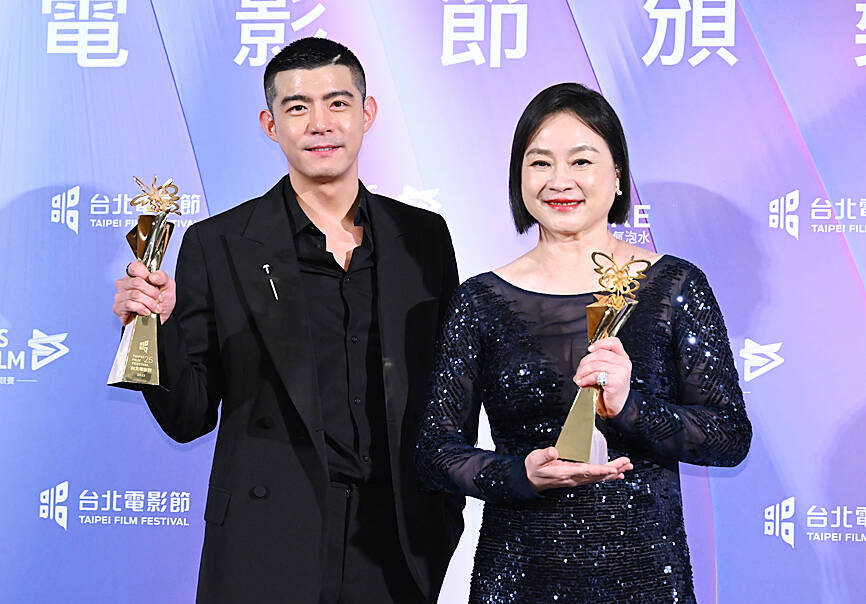Diamond Marine World (鑽石水族世界), a documentary about an ambitious Taiwanese man struggling to survive in Myanmar, was awarded the Grand Prize and Best Documentary awards at the Taipei Film Awards on Saturday.
The film by director Huang Hsiu-yi (黃琇怡) documents the journey of a Taiwanese shrimp farmer who plans to make a fortune by starting a venture in Myanmar, but is accused of criminal activities shortly after arriving there.
Diamond Marine World is a film about Taiwanese trying to chase prosperity in Southeast Asia, Huang said after accepting the Grand Prize, which includes NT$1 million (US$31,918) in prize money.

Photo: Hu Shun-hsiang, Taipei Times
She added that “it is a story about trust, love and forgiveness.”
The jury said Huang’s documentary showed her ability to sift through the vast amount of footage she had shot in Myanmar and condense it into an “honest and touching” work about the struggles of people with different values and cultural backgrounds.
The jury also commended Huang for her dedication to the work, highlighting that she had filmed in Myanmar for several years on an “extremely tight budget.”

Photo: Hu Shun-hsiang, Taipei Times
Huang received a grant of NT$800,000 from the government-funded National Culture and Arts Foundation in 2019 to make the documentary, government data showed, but the film’s total budget is unknown.
This year’s Best Narrative Feature Award was given to Gaga (哈勇家), a story about an Atayal tribal family struggling to cope with one unfortunate incident after another.
With an absurd local election as the backdrop, Gaga delicately presents the close bond between the members of the Atayal family and the various challenges facing them and their tribe, the jury said.
Director Laha Mebow (陳潔瑤), who is an Atayal, said in her acceptance speech that it takes a lot of passion to work in the film industry, because “there is often more agony than joy” in the filmmaking process.
Mebow said she would embrace this pain and continue making films to tell more stories about Taiwan’s indigenous people.
Saturday’s big winner was director Lin Chun-yang’s (林君陽) film Eye of the Storm (疫起), which was awarded the Best Director, Best Actor, Best Art Design, Best Visual Effects and Outstanding Artistic Contribution awards.
The movie, inspired by the 2003 SARS outbreak in Taiwan, portrays a group of young medical workers grappling with a deadly disease and tense human relationships in a hospital that has been sealed off.
The Outstanding Contributions Award went to photographer Liu Chen-hsiang (劉振祥) in recognition of his still images for movies made by award-winning directors Hou Hsiao-hsien (侯孝賢) and Chung Mong-hong (鍾孟宏).
The Best New Talent Award was shared by Wilang Lalin (洪金輝) for his role as a father struggling with uncertain future prospects in Gaga, and Yeh Hsiao-fei (葉曉霏) for her role as a student protester in the coming-of-age film Who’ll Stop the Rain (青春並不溫柔).
The Taipei Film Awards received 292 submissions: 40 feature films, 61 documentaries, 160 short films and 31 animations. Of those, 29 films were nominated for the competition, the awards organizers said.

CALL FOR SUPPORT: President William Lai called on lawmakers across party lines to ensure the livelihood of Taiwanese and that national security is protected President William Lai (賴清德) yesterday called for bipartisan support for Taiwan’s investment in self-defense capabilities at the christening and launch of two coast guard vessels at CSBC Corp, Taiwan’s (台灣國際造船) shipyard in Kaohsiung. The Taipei (台北) is the fourth and final ship of the Chiayi-class offshore patrol vessels, and the Siraya (西拉雅) is the Coast Guard Administration’s (CGA) first-ever ocean patrol vessel, the government said. The Taipei is the fourth and final ship of the Chiayi-class offshore patrol vessels with a displacement of about 4,000 tonnes, Lai said. This ship class was ordered as a result of former president Tsai Ing-wen’s (蔡英文) 2018

UKRAINE, NVIDIA: The US leader said the subject of Russia’s war had come up ‘very strongly,’ while Jenson Huang was hoping that the conversation was good Chinese President Xi Jinping (習近平) and US President Donald Trump had differing takes following their meeting in Busan, South Korea, yesterday. Xi said that the two sides should complete follow-up work as soon as possible to deliver tangible results that would provide “peace of mind” to China, the US and the rest of the world, while Trump hailed the “great success” of the talks. The two discussed trade, including a deal to reduce tariffs slapped on China for its role in the fentanyl trade, as well as cooperation in ending the war in Ukraine, among other issues, but they did not mention

HOTEL HIRING: An official said that hoteliers could begin hiring migrant workers next year, but must adhere to a rule requiring a NT$2,000 salary hike for Taiwanese The government is to allow the hospitality industry to recruit mid-level migrant workers for housekeeping and three other lines of work after the Executive Yuan yesterday approved a proposal by the Ministry of Labor. A shortage of workers at hotels and accommodation facilities was discussed at a meeting of the legislature’s Transportation Committee. A 2023 survey conducted by the Tourism Administration found that Taiwan’s lodging industry was short of about 6,600 housekeeping and cleaning workers, the agency said in a report to the committee. The shortage of workers in the industry is being studied, the report said. Hotel and Lodging Division Deputy Director Cheng

‘SECRETS’: While saying China would not attack during his presidency, Donald Trump declined to say how Washington would respond if Beijing were to take military action US President Donald Trump said that China would not take military action against Taiwan while he is president, as the Chinese leaders “know the consequences.” Trump made the statement during an interview on CBS’ 60 Minutes program that aired on Sunday, a few days after his meeting with Chinese President Xi Jinping (習近平) in South Korea. “He [Xi] has openly said, and his people have openly said at meetings, ‘we would never do anything while President Trump is president,’ because they know the consequences,” Trump said in the interview. However, he repeatedly declined to say exactly how Washington would respond in